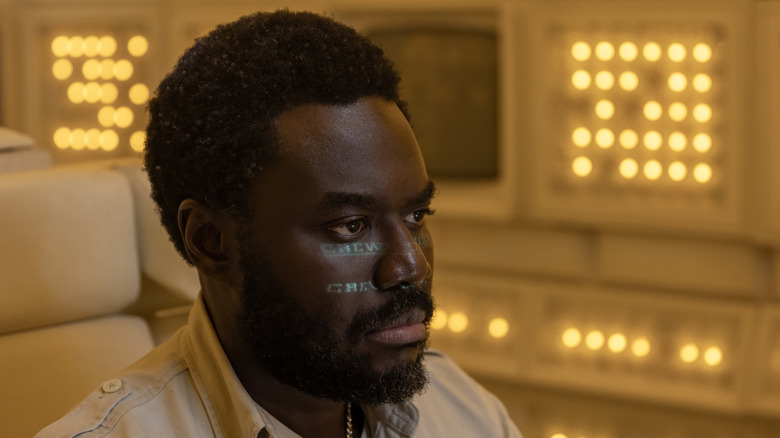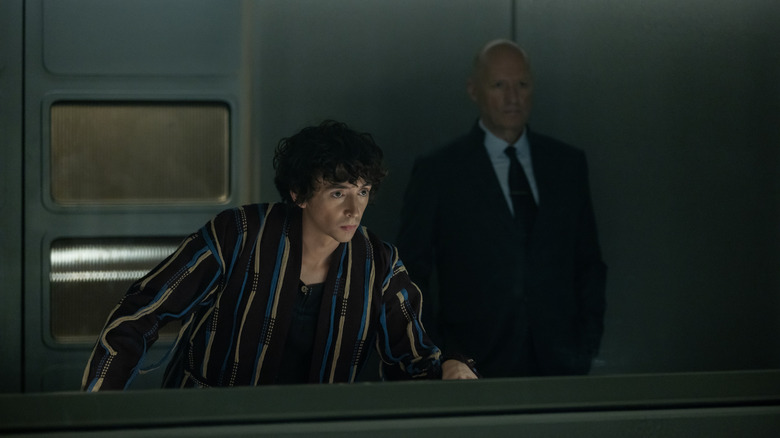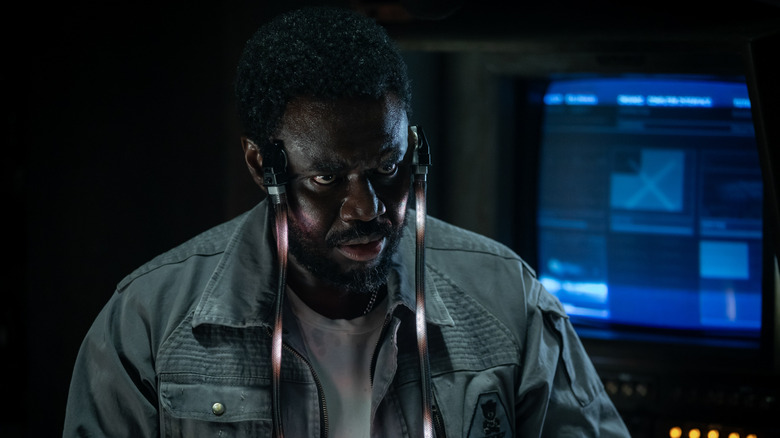Alien: Earth Hides Its Darkest Horror In Plain Sight (And It's Not The Xenomorph)
"Alien" has always been, first and foremost, a horror franchise. The science fiction aspect of the film may shine brighter for those of us more inclined to that particular genre (guilty), but the suspense, scares, and monsters loom larger than the extensive sci-fi worldbuilding, which tends to occupy the background of the movies more than the foreground. Perhaps the reason why Ridley Scott's "Prometheus" split the fan base so significantly is because it brought the more sci-fi storylines like synthetic consciousness, corporate politics, and ancient aliens to the forefront.
FX's new series "Alien: Earth" does that as well, with the meat of its story focusing on androids, cyborgs, and the experimental "hybrids" of the Prodigy corporation. Scares still play a key role, but it isn't until episode 5 — a flashback episode explaining what happened aboard the Maginot — that we get a full-blown horror story in the style of the movies.
Episode 5 is basically an standalone "Alien" short film, and it's one of the show's best episodes yet. The episode primarily follows Maginot security officer Morrow (Babou Ceesay) as he works to uncover the identity of a saboteur aboard the ship's crew, all while that sabotage begins to let the various alien specimens out of their cages. While we get plenty of classic spooks and gory kills, the real horror of the episode is in the further exploration of the show's corporate society. With Morrow as our eyes, we see in new detail just how brutal life is under the show's autocratic corporate rule, which essentially turns employees into slaves at the whim of their wealthy overlords. Of course, you may have missed some of these details, as they're included on the letters from Morrow's daughter — requiring a few pauses to fully process.
Morrow's tragic life reveals Alien's corporate brutality
In the middle of "Alien: Earth" episode 5, Morrow takes a moment to himself in his quarters, where he reads over what appear to be letters from his daughter Estelle faxed through space to the Maginot. Because it's a 65-year mission, he would have missed most of her life regardless, but the letters reveal that she died in a fire just a few years into the voyage, shedding some light on Morrow's state of perpetual anger. While that's obviously a tragedy, the other details hidden in the letters are arguably the more horrifying bits.
"Mom says that Weyland-Yutani will pay for all my school," Estelle writes in one letter, where she talks about looking at colleges. "That's IF I go to a Wey-Yu sanctioned school." In the same letter, she mentions learning that her classmates only get partial scholarships, revealing Morrow's importance within the company.
On its face, this may not sound too crazy, but think about it for a minute. This is essentially taking the broken U.S. healthcare system — one where coverages are constantly denied and the right care seems to always be "out of network" — and applying it to another basic need: education. We've seen in the present-day "Alien: Earth" timeline that medical debts and work contracts can basically enslave people to their respective corporations for their entire lives. How expensive would a college education be for someone whose father hadn't committed 65 years of his life to outer space? What about families who have no corporate contracts at all? It's safe to assume that housing, healthcare, maybe even access to food and clean water are all dependent on corporate allegiance. After all, when the corps own everything, why not demand everything from their citizens in exchange?
The Maginot crew are indentured servants, not employees
The letters from Estelle paint a grim picture of Earth under corporate rule, but the crew of the Maginot show an even worse side of things. They don't get paid in money, per se, but in shares of the company. And how many shares, you might ask? For someone low down the chain of command, one quarter share for 65 years of their life. It's a horrific, almost laughable compensation, but hey, it's money, right?
Here's the thing, though: Paying an employee in shares, rather than cash, effectively keeps them indentured in perpetuity. What good is the value of a Weyland-Yutani share if you were to move to a city run by a different corporation? It's the ultimate extrapolation of the company town, where workers are given tokens to spend at the company store and put up in company housing, but with no real means of ever escaping, as Rick and Morty would put it, slavery with extra steps.
As the corporations spend trillions of dollars trying to make life synthetic, organic life suffers, squeezed out by outrageous costs of living and a society that has removed all margins for upward momentum. It's a cyberpunk dystopia that might feel a bit more fantastical if it weren't so depressingly comparable to our present moment.


